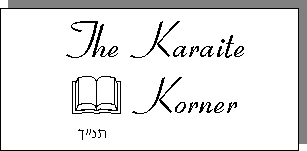

|
Abib in the Biblical Calendar
The Biblical Year begins with the first New Moon after the barley in the Land of Israel reaches the state in its development which the Bible calls "Abib". Only by fixing the calendar in accordance with the barley crops can we fulfill the commandment to "Keep the Month of the Abib" (Dt 16,1) and to celebrate Hag HaMatzot (Feast of Unleavened Bread) "at the time of the month of the Abib, because in the month of the Abib you went out of Egypt" (Ex 34,18). One characteristic of Karaism throughout the generations was that it always clung to the Biblical precept to "Keep the Month of the Abib". Till this very day every Karaite takes an oath "to keep the holy Holidays of YHWH according to the observation of the moon and the finding of the Abib in the holy Land of Israel". Throughout the Middle Ages great effort was made to send messengers to Palestine to check on the state of the barley crops and it was not uncommon that the Karaites would celebrate the holidays one month after the Rabbinites. As late as 1641 we learn from a Karaite pilgrim from the Crimea that the Karaites of the Middle East still followed the Biblical calendar and that in that year they celebrated all the holidays one month after the Rabbanites. Most Karaites today have adopted the Rabbanite "19-year cycle". Instead of fixing the First Month according to the barley crops (Abib), the 19-year cycle arbitrarily sets every 2nd or 3rd year as a leap year. Those Karaites who adopted the Rabbanite 19-year cycle did so with the belief that it accurately approximates the Abib in the Land of Israel. Indeed the "19-year cycle" was invented to approximate the Abib at a time when the Rabbanites had difficulty getting reliable reports from the Land of Israel. After all, the Rabbanites do not deny that it is the state of the barley crops which determines the date of Passover (see Sanhedrin 11a). Yet actual observation of the barley crops has proven that the "19-year cycle" is often in error and does not always give the Month of the Abib as the month for Passover. In recent years a growing movement of Abib keepers has begun to investigate the state of the barley crops in Israel. In many of the years since we have begun checking the barley, the Rabbanites and most of those who call themselves "Karaites" celebrated the Biblical Holidays one month too early! It is important to keep all of the Biblical Feasts and Holidays in their proper time as it is written "These are the Holidays (Mo'adim) of YHWH, holy convocations which you will call in their appointed times" (Lev 23,4). Keeping the upcoming Hag Ha-Sukkot (Feast of Booths) is especially important as we are warned explicitly of the consequences of not observing this Holiday: "And it will be that whoever will not go up of all the families of the earth to Jerusalem to prostrate to the King, YHWH Tzevaot, there shall be no rain upon them... there will be the plague with which YHWH smites the nations that will not go up to celebrate the Feast of Booths (Hag Ha-Sukkot)." (Zechariah 14,18-19) Abib-based Calendar in 1999 According to the Abib (barley) and the New Moon the Biblical Feasts and Holidays in 1999 fall out on the following dates:
Work of any form is strictly forbidden on these days. Please note that each holiday begins at sunset on the previous Gregorian calendar day listed and lasts until the following sunset (for example the Yom Teruah Holiday starts on October 10th at sunset and lasts until October 11th at sunset). The above dates are based on the visibility of the New Moon and the Abib (barley) in the Land of Israel. Both the Rabbanites and most "Karaites", will be celebrating the Biblical holidays one month before their proper time because they follow the Rabbanite 19-year cycle and not the Abib in the Land of Israel. Read more about the Abib and peruse this year's Abib reports at: Abib in the Hebrew Bible Read more about the Biblical Holidays at: Karaite Holidays |